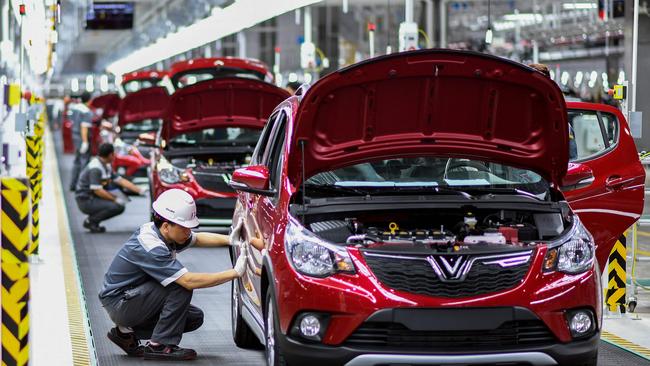Car parts squeeze slams the brakes on economic recovery
The stalled car industry is holding back the global economic recovery, as factory shutdowns and parts shortages batter production and sales of new vehicles.

The stalled car industry is holding back the global economic recovery, as factory shutdowns and parts shortages batter production and sales of new vehicles.
Despite strong global demand for cars, the OECD estimates actual production will slump 25 per cent this year due mainly to the scarcity of microchips, which could extend well into next year.
Vehicle manufacture accounts for a sizeable share of GDP in Japan, Germany and other major European countries.
“The car sector has been particularly affected by supply bottlenecks, and output and sales have fallen sharply … holding back the overall recovery,” the OECD said this week in its Economic Outlook.
The report forecasts world GDP growth to ease to 4.5 per cent next year from this year’s 5.6 per cent.
Between April and September, global car sales fell 20 per cent, “a pace of decline only seen previously in deep recessions, such as the early stage of the pandemic last year,” the Paris-based body said.
“The combination of solid demand and the reduction in supply has placed upward pressure on prices. New and used car prices have risen substantially this year in several countries, especially the US.”
In Australia, new vehicles sales plunged 15 per cent in the year to November, as potential buyers were unable to get their hands on imported vehicles, with especially long waiting times for popular SUVs and electric vehicles.
On Friday, Federal Chamber of Automotive Industries chief executive Tony Weber said “demand across the sector remains strong, with the drop in sales reflecting well-recognised international supply chain issues”, including “constraints around microprocessor supplies as well as the ongoing impact of the pandemic restricting factories”.
“Carmakers are competing with many other sectors, such as white goods manufacturers, for microprocessors. Some new vehicles sold in the Australian market can require up to 3000 of these parts, so this shortage is definitely being felt by the industry.”
The slide in local car sales follows national accounts figures this week which showed household spending on vehicles dropped 9 per cent in the September quarter.
Disruptions to supply chains are affecting many imported consumer products this Christmas gift season, including foods, alcohol, electronic games and toys, as well as materials used in construction, manufacturing and diesel fuel.
According to the Australian Bureau of Statistics, import volumes fell by 4 per cent in the September quarter, “reflecting continued global supply constraints and a fall in domestic demand”.
The OECD said the vehicle sector accounted for about one-tenth of global semiconductor demand. In cars, these microprocessors govern essential operations such as engine cooling, battery management, tyre-pressure monitoring, interior lighting, and emergency braking.
“At the onset of the pandemic, when automotive producers cut orders for chips in anticipation of lower demand, semiconductor producers shifted part of their production to supply producers of computers, webcams, tablets and other electronic and communications equipment, where sales were soaring,” the OECD report said.
“This redirection of semiconductor supply has contributed to the shortages carmakers are facing currently when they wish to expand production”.
Two-thirds of total microchip demand is due to communications and computers.
“In this context, given that it is likely to take semiconductor makers at least six to nine months to realign production, the current supply shortage for motor vehicle manufacturers may continue well into 2022,” the OECD said.



